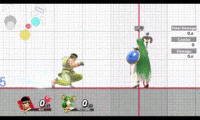Kara Canceling: Difference between revisions
No edit summary Tag: Mobile edit |
(further corrected the full array of terry's kara canceling options, and fixed formatting regarding hyperlinks to those related pages) |
||
| Line 2: | Line 2: | ||
[[File:Karacancel.gif|thumb|{{SSBU|Ryu}} Late Kara canceling down smash into Shoryuken]] | [[File:Karacancel.gif|thumb|{{SSBU|Ryu}} Late Kara canceling down smash into Shoryuken]] | ||
{{merge|Special move canceling|Kara canceling is a subset of special move canceling in general.}} | {{merge|Special move canceling|Kara canceling is a subset of special move canceling in general.}} | ||
'''Kara Canceling''' is an [[advanced technique]] introduced in ''Super Smash Bros. 4'' and ''Super Smash Bros. Ultimate''. It is exclusive to [[Ryu]], [[Ken]], and [[Terry]]. In the case of Ryu and Ken, it allows the user to cancel the start-up frames of one of several normal attacks, aerials, and down smash (in ''Ultimate'') into a [[command-input move]]. In Terry's case, he has Kara Canceling in a more limited form, only capable of canceling his | '''Kara Canceling''' is an [[advanced technique]] introduced in ''Super Smash Bros. 4'' and ''Super Smash Bros. Ultimate''. It is exclusive to [[Ryu]], [[Ken]], and [[Terry]]. In the case of Ryu and Ken, it allows the user to cancel the start-up frames of one of several normal attacks, aerials, and down smash (in ''Ultimate'') into a [[command-input move]]. In Terry's case, he has Kara Canceling in a more limited form, only capable of canceling his [[Terry (SSBU)/Neutral attack|jab 1]], [[Terry (SSBU)/Forward tilt|forward tilt]], [[Terry (SSBU)/Up tilt|up tilt]], [[Terry (SSBU)/Down tilt|down tilt]], aswell as [[Terry (SSBU)/Neutral aerial|neutral]], [[Terry (SSBU)/Up aerial|up]], and [[Terry (SSBU)/Down aerial|down aerial]]s respectively. | ||
==How To Perform== | ==How To Perform== | ||
Revision as of 03:14, September 28, 2023

Kara Canceling is an advanced technique introduced in Super Smash Bros. 4 and Super Smash Bros. Ultimate. It is exclusive to Ryu, Ken, and Terry. In the case of Ryu and Ken, it allows the user to cancel the start-up frames of one of several normal attacks, aerials, and down smash (in Ultimate) into a command-input move. In Terry's case, he has Kara Canceling in a more limited form, only capable of canceling his jab 1, forward tilt, up tilt, down tilt, aswell as neutral, up, and down aerials respectively.
How To Perform
Kara Canceling is performed by first performing certain attacks and then inputting a command-input move. The input window is small, being only the first 3 frames after starting a move (effectively a 4 frame window counting the initial attack). The small window can make it difficult to perform as multiple inputs are needed to use a command-input. The directional input for the initial move can carry over to the inputs for the command-input move, for example Ryu/Ken can use the down input from a down tilt as the down input for a Hadoken (↓ ↘ → or ↓ →), saving a frame for an input and thus making these types of Kara Cancels easier.
A variant of this technique with its own activation method was introduced in version 7.0.0, exclusively for Ryu and Ken. Known as the Late Kara Cancel, it can be performed by first activating down smash, then, in the first 5 frames of the animation, performing a command-input move. If done correctly, the down smash animation will be canceled into the special move even if the move does not hit anything. This can be used as a mixup option for adding range to attacks to surprise the opponent. Specifically with Tatsumaki Senpukyaku, Ryu and Ken can have a large boost of speed near the start of the move and cover noticeably more distance than normal, as a result. In the case of Ryu, Tatsumaki Senpukyaku is a kill move, making this an effective burst option in certain situations. It occurs due to momentum changes during the animation of down smash, which then get cancelled into a special move, and the momentum of both are combined.
Origin
The Kara Cancel can be traced to the 1991 arcade fighting game Street Fighter II: The World Warrior. After receiving complaints that the input window for all attack, but especially special moves in the first Street Fighter game was too strict, Capcom decided to give players the ability to cancel a move within the first 5 frames of activation, likely as a buffer for players that press the button to perform a special move too early. This made inputs much easier to perform, but caused an unintended side effect where players could cancel the startup of specific moves into special moves. This is due to the input window overlapping with the attack animation and special moves being prioritized over all other animations. This oversight is often recognized as creating the first instance of modern combos in fighting games, as the ability to cancel animations and hit opponents before they exit hitstun was not an intentional mechanic during development.
Kara Canceling was especially notable in the 1997 game Street Fighter III: The New Generation, as well as the rest of the Street Fighter III series, with the ability to cancel many normals into a grab, called a Kara Throw, allowing throws to have much more range than intended.
The glitch was well received by fans and became an integral part of competitive play. Capcom decided to keep Kara Canceling for future Street Fighter releases by making it an official game mechanic, and even made balance changes with Kara Canceling in mind, such as Ken and Sagat in the Street Fighter IV series.
